Long Live the King

Today, January 8, is Elvis Presley’s birthday. He would have been 72.
When people learn I am an Elvis specialist, they often ask me, “Did Elvis Presley make any good movies?”
The answer, sadly, is no. Elvis Presley did not make any good movies.
There are, however, good Elvis Presley movies.
Elvis Presley made 31 feature films between 1957 and 1969 and, by any objective measure, they’re all terrible. Elvis movies, like James Bond movies, Star Trek movies, Bollywood musicals, Italian zombie movies and Japanese horror movies, cannot be enjoyed if compared to other “real” movies. They’re horrible. They’re beyond horrible. They’re stupid, boring and comically inept. You watch an Elvis movie and you can’t believe people went to see them, three times a year, for ten years. You watch an Elvis Presley movie and you can’t believe Elvis Presley was ever a star, much less the most important American artist of the twentieth century. You watch an Elvis movie and it seems unbelievable that Elvis was, when his film career began, the biggest star on the planet. You watch an Elvis movie and you have to remind yourself that these movies were made at the same time as Dr. Strangelove, West Side Story, Persona, Lawrence of Arabia, Jules et Jim, Bullitt, 2001: A Space Odyssey and Bonnie and Clyde, not to mention A Hard Day’s Night, Help! and Yellow Submarine. The biggest star on the planet couldn’t get a decent movie made around him to save his life. And as a result, he became no longer the biggest star on the planet.
There are a lot of reasons for this, which I can go into another time. Hint: they have to do with Col. Tom Parker being an evil, evil man.
For us Elvis fans, the movies’ flaws only make them more endearing. If you take them on their own terms, if you approach them with the same level of expectation you would have for, say, an episode of Here’s Lucy, they are perfectly engaging. As a chapter in Elvis’s career, they are an important step in his development as an artist — that is to say, they gave him twelve years of unbelievably crappy songs to sing so that he could “come back” in 1968.
THE WELL-INTENTIONED GENRE PIECES
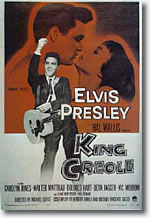
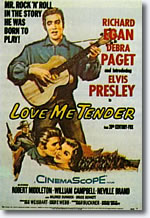

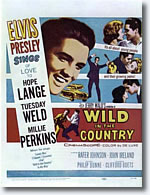
Cineasts will say that King Creole, which co-stars Walter Matthau and is directed by Michael Curtiz, qualifies as a “good” Elvis Presley movie. But they are wrong. King Creole is a middling noir which, for some reason, stars Elvis Presley. Elvis tried to make a number of “real” movies, that is, movies that “just happened” to star Elvis Presley. These include Love Me Tender, a Civil War drama, Wild in the Country, a “juvenile delinquent” drama written by Barton Fink himself, Clifford Odets, and Flaming Star, a western drama, starring Elvis as a half-breed, directed by Don Siegel. It’s impossible to enjoy these movies as genre pieces because, well, because Elvis Presley is in them. He’s not believable as a cowhand, a half-breed or a down-on-his-luck kid. First, he’s not a very talented actor, second, he throws off charisma like a 1,000,000-watt lightbulb, blasting character, plot and every other actor offscreen (or into irrelevance). So you’ll have a couple of actors sitting around talking, pretending they’re in a “real movie,” and then ELVIS PRESLEY walks in and any sense of watching a “real movie” goes right out the window. It doesn’t get any better when he starts singing; there’s no reason why these movies would need to have singing in them at all (they were all developed as dramas — King Creole was originally about a boxer who gets into trouble with the mob [that is to say, it was originally a boxing movie]) –songs were shoehorned into existing scripts and it shows.
Of these four, King Creole has the best songs — that is, real Elvis Presley songs, not cringe-inducing novelty numbers (which sprout in abundance later, as we will see). The title song is a smash and the movie also includes “Hard Headed Woman, “Trouble” and “Crawfish.”
THE CREAM OF THE CROP
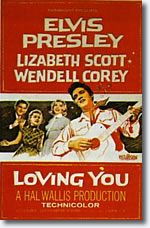
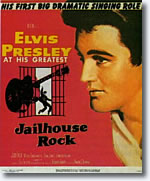
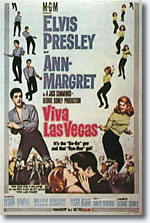
This is it. This is the best Hollywood could do. These three movies have it all. Elvis plays someone very much like himself, so there isn’t that awkward Elvis/reality schism. He sings, all-in-all, wonderful songs opposite real actors. He explodes off the screen. He is sexy, hot-headed, dynamic, graceful and bursting with energy. The direction and editing have zazz and pluck. In Viva Las Vegas, he even stars opposite a woman who can hold the screen with him. They are superlative entertainments and, more importantly, they are excellent showcases for Elvis’s talent. Viva Las Vegas also gets a gold star for being the one “Elvis Movie” that shows that the whole idea of an “Elvis Movie” can work as entertainment.
By “Elvis Movie” I’m speaking of a classically stupid, unbelievable, nonsensical concept that exists simply as an excuse for Elvis to sing, do something “exciting” (usually in front of obvious rear-screen projection) and kiss pretty girls. In the case of Viva, for instance, Elvis is a singing race-car driver who has to choose between wooing Ann-Margret and winning the big race. See? You wouldn’t go to see that movie. That’s a stupid idea for a movie. It is, in fact, a retarded idea for a movie. Imagine, if you will, George Clooney starring as a singing race-car driver who must choose between wooing Ann-Margret and winning the big race. You couldn’t get that movie made today. But it makes perfect sense as an Elvis Presley movie and is the model for the genre. The soundtrack also includes “You’re the Boss,” a number cut from the movie, that sounds astonishingly like Elvis singing on a Tom Waits record.
THE BIG-BUDGET ELVIS MOVIES
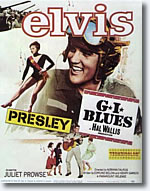

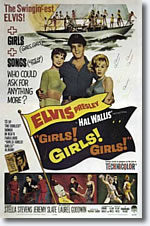
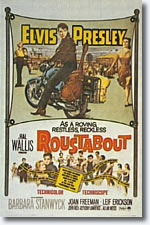
These movies are all professionally made, make no sense, are produced by Hal Wallis, made money and do what they’re supposed to do. I hate them. They are boring, pedestrian, and exist to make Elvis Presley “safe” for middle-class America.
There is a thing that happens in Elvis movies, where the composers can’t be bothered to come up with an original song so they re-purpose a copyright-free song and write new words to it. In Blue Hawaii it’s “Alouetta.” In another one it’s “Three Blind Mice.”
Girls! Girls! Girls! features “Song of the Shrimp,” where Elvis sings the tale of a shrimp who longs to climb aboard a shrimp boat to see the legendary land of Louisiana. All four of these movies include lullabies, and/or songs sung to mothers.
MY PERSONAL FAVORITES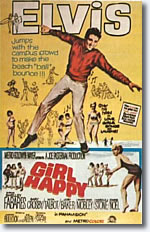
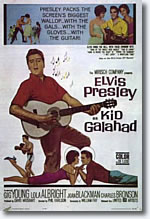
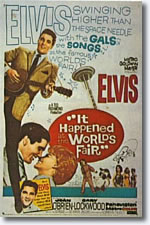

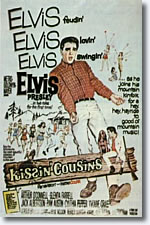
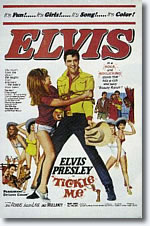

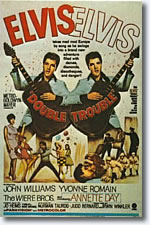
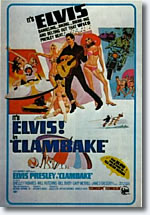
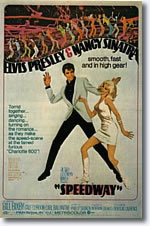
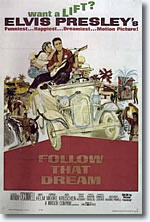
You always love your retarded children more than the others. Producers other than Hal Wallis discovered that you could make more money with a cheap Elvis movie than you could with an expensive Elvis movie. And this accounts for the bulk of the Elvis filmography, what I like to think of as the “real” Elvis movies. They have the texture of Formica, the depth of cellophane and the complexity of a gallon of buttermilk. They don’t feel like movies at all, they feel like episodic television. This week on Elvis, Elvis is caught behind the Iron Curtain and must match wits with batty spies in order to get to his big singing gig! They are uniformly genial, sporadically charming and cinematically dead on arrival.
In each one Elvis plays a singing racecar-driver/speedboat-driver/cliff-diver/helicopter-pilot/boxer/hillbilly who has to win the race or win the big fight or solve the mystery. In Tickle Me he has to hunt for buried treasure in an abandoned western town which may or may not be haunted. Four decades of Scooby-Doo adventures have robbed this movie of much of its surprise.
Novelty songs abound, and I pretty much adore every song from every one of these movies. Girl Happy has the best of them, a charming number called “Fort Lauderdale Chamber of Commerce.” (yes, you read that right.) Paradise Hawaiian Style features “A Dog’s Life,” which is sung to, who else, a helicopter full of dogs, and also “Queenie Wahini’s Papaya.” Fun in Aculpulco has “No Room to Rhumba in a Sportscar.” Tickle Me, the cheapest of the movies, actually benefits from not having any “new” songs for Elvis to sing. Instead, he gets to sing some actual blues numbers from his post-army years, and one is actually reminded for a moment that he is one of the most significant American talents of all time.
It Happened at the World’s Fair includes a cameo by the young Kurt Russell, who plays a snot-nosed brat who kicks Elvis in the shin. It also contains the only intentionally funny joke in the Elvis filmography: Elvis walks down a street by himself, flips through his “little black book,” looking up a girl who lives nearby. He finds her name and recites “Mary. Hmm. 36-24 — pause — Maple Street.” He then cocks his eyebrows and moves on.
Clambake holds a special place in my heart. It represents what may possibly be the nadir of Elvis’s personal life. He had put on thirty pounds or so, was taking spiritual advice from his barber, and had cracked his head open on a sink the night before shooting began during one of his adventures in pharmacology. As a result, his hair is combed into permanent, shellacked bangs and the belted leisure suits he wears make him look like Ubu Roi. It also features the worst song, bar none, of his career, a “High Hopes” knockoff called “Confidence,” which he sings to a playground full of kids. Now, keep in mind that, ten years earlier, Elvis Presley was enraging parents, scandalizing censors and making teenage girls go weak in the knees. Now he’s singing to children about building confidence. It’s an obscenity. I love it.
THE ALSO RANS
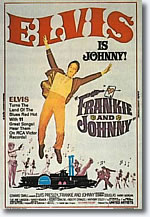

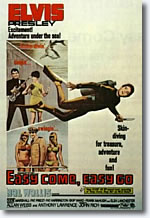
What does it say about a movie when it just isn’t quite as good as a low-budget Elvis movie? And yet, these movies, for whatever reason, don’t make the cut. Easy Come, Easy Go, in spite of being a Hal Wallis production, is a stupefying atrocity, where Elvis, no kidding, plays a singing scuba diver who must battle evil hippies in order to find sunken treasure. Live a Little, Love a Little is a Mad Ave comedy that co-stars Rudy Vallee and features a “psychedelic” number, “Edge of Reality,” where Elvis sings to a man in a Great Dane costume. Frankie and Johnny is a period piece which should, theoretically, give Elvis a chance to explore the roots of his music, but which does not.
MUST TO AVOID


Harum Scarum isn’t just a bad Elvis movie, it’s one of the worst movies ever made by anyone. Agonizingly boring, impossible to sit through, full of crappy songs, cheap sets, bored actors, nonexistent editing and uninspired writing and direction. Stay Away, Joe, in addition to having perhaps the worst title of any Elvis movie (they might as well have called it Stay Away, Audience), features Elvis, I could not invent this, singing a song to an impotent bull.
THE LATE EXPERIMENTS
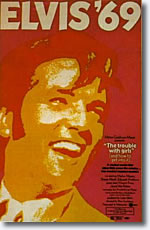

Late in his film career, Elvis abruptly stopped making “Elvis Movies” and returned to trying to make “real” movies. Charro! is a Clint Eastwood western without songs, The Trouble With Girls is a bizarre, unwieldly, Altmanesque portrait of life on the Chatauqua circuit circa 1929, and Change of Habit is an urban “problem drama” with Elvis starring as a ghetto doctor who falls in love with a nun. The nun (Mary Tyler Moore) must choose between Jesus and Elvis.
They all suck, although Change of Habit does hold the viewer in a certain stateof ghastly fascination.
